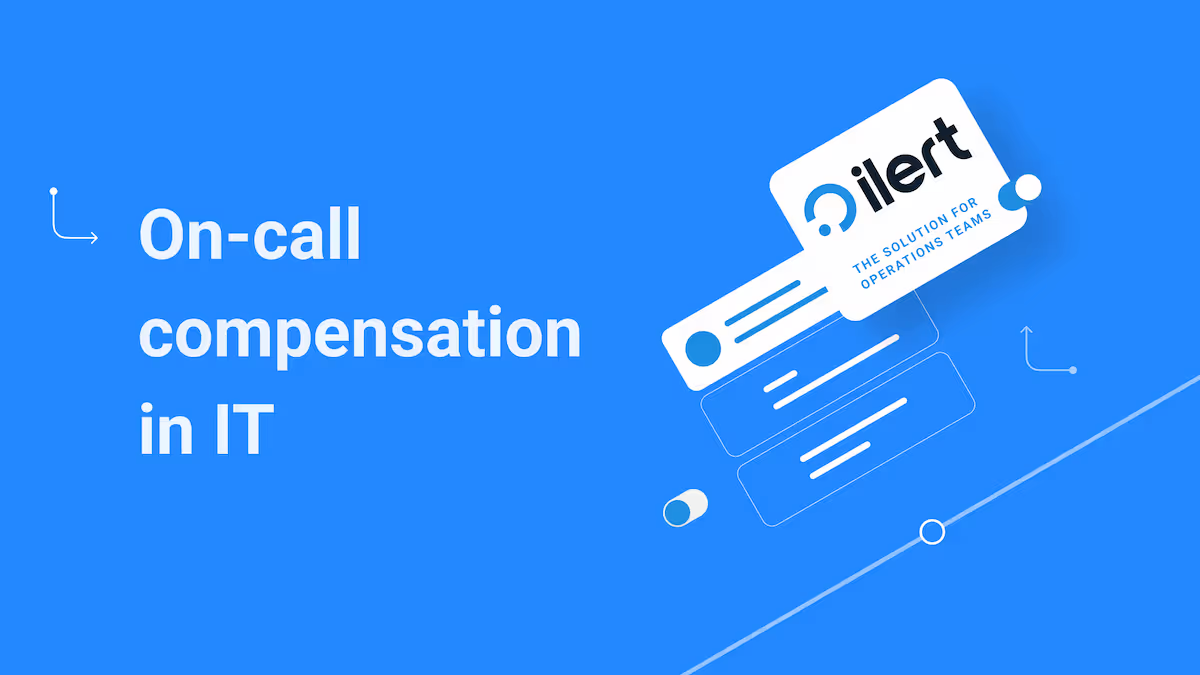On-call compensation for IT engineers in 2025

Imagine it’s 2 AM and a critical system flatlines without warning. A bleary-eyed on-call engineer scrambles to restore service, shielding customers from a major outage that could torpedo your next Service Level Objective (SLO) review. Yet when daylight returns, debates over fair on-call compensation start all over again: What’s “just” pay for sleepless nights, unpredictable pings, and rapid-fire incident responses?
What counts as on-call?
On-call is a special working hour arrangement under employment law. It comes into effect when the employee is obliged to be contactable at least by phone, so they can start work in an emergency. On-call duty is generally counted as time specifically meant for work purposes.
In practice, this means that employees are normally not allowed to work while on call. However, there may be exceptions. For example, on-call employees may also work from home if they can be reached through their work device.
What's the difference between on-call and stand-by service?
There’s a time-and-location gap between the two models:
- On-call – employees stay reachable (phone, pager, or on-call management app) and can log in from anywhere when an alert fires.
- Stand-by – staff must be physically present on site and ready to act immediately. German labour law labels this Bereitschaftsdienst as working time and treats it accordingly.
In IT operations, remote on-call service is usually preferred because most incidents (code rollbacks, config tweaks) can be resolved over VPN. Stand-by still matters for latency-critical environments, for example, trading platforms or industrial control systems, where a technician must monitor hardware and intervene within seconds to meet strict service-level agreements.
Are on-call hours the same as work hours?
Whether on-call duty counts as working hours isn’t as clear-cut as it looks. Under most labour-law frameworks – including Occupational Safety and Health guidance and the U.S. FLSA Fact Sheet #22 – passive on-call time is treated as rest time as long as no alert comes in. The moment you’re paged and start troubleshooting, those minutes flip to active working time. In borderline cases, courts (e.g., Germany’s BAG, Oct 2023 ruling 6 AZR 210/22) decide which periods qualify, so definitions often vary by jurisdiction and company policy.
There’s also no universal rule on pay. Many employers treat on-call duty as billable work and compensate it accordingly; others classify passive standby as unpaid availability. If your firm uses the latter model, remember you won’t be reimbursed for simply being reachable.
Bottom line: on-call time isn’t always the same as working time – it hinges on the organisation’s compensation policy. Some U.S. big-tech companies (Airbnb, Apple, Netflix) don’t pay for passive standby, while many European tech firms do.
On-call duty times
On-call scheduling is usually confined to specific nights or weekends agreed in advance and written into the employment contract. Because fewer staff are on site during those hours, reliable night- and weekend coverage is essential.
In Germany, the ICT trade group Bitkom recommends capping on-call assignments at 56 days per calendar year and guaranteeing at least 8 consecutive hours of rest per shift – Bitkom’s guideline on Rufbereitschaft im IT-Betrieb. On-call duty is generally classified as non-working time, so the usual 11-hour rest break required by §5 (1) of the Arbeitszeitgesetz does not apply until the engineer has actively worked on an incident.
Need an easy way to keep those limits visible? ilert’s on-call scheduling shows every planned rotation and actual shifts at a glance, so teams stay compliant without spreadsheets.

How is payment settled for on-call service in IT companies?
In IT companies, on-call hours are usually considered working time and are paid as such. As mentioned above, be sure to clarify this with your employer in advance to check what is stated in your contract.
For large corporations like Airbnb or Apple, which do not pay for on-call time, the argument is that their employees are already among the top earners. This means that their employees still earn much more than they would at most companies that pay on-call time in addition to their salary.
In Germany, there is no specific law regarding how on-call hours should be paid. This is, therefore, left up to the employer’s discretion. Most commonly, however, on-call duty is generally paid working time, i.e., the employee receives payment for the time he or she is on-call. This can be structured in different ways.
In practice, on-call time is often compensated either on top of the standard hourly wage or with time off. In many companies, on-call time is also counted as working time and is paid for accordingly. However, this is only possible if the employee is working rather than being only available by phone. As already mentioned, this would be the case while working from home.
In most tech organisations, hours spent on-call count as paid working time, yet the formula changes from company to company. Before you join a rota, double-check your contract or the internal on-call compensation policy.
In practice, you’ll see two common models:
Hourly uplift
A percentage on top of the standard rate for every scheduled standby hour.
Time-off swap
Eight hours on-call earn four hours of paid leave.
Remember, only the minutes you actively work are universally classed as working time; simply being reachable may stay unpaid unless your company’s policy says otherwise.
How are on-call services paid in IT companies?
Pay still varies by company size, sector, and risk profile. The federal collective agreement for public employees (TVöD) specifies the following allowances in § 8 Abs. 3:
Stand-by shifts of 12 hours or longer
- Weekdays (Mon–Fri): paid at 2 X the hourly rate for the entire day.
- Weekends and public holidays: paid at 4 X the hourly rate for the entire day.
Shorter stand-by windows (under 12 h)
Earn an additional 12.5 % of your hourly rate for each hour on call.
For work in a large corporation or a successful start-up, you can expect to earn about €1,000 per week. At Zalando, the on-call compensation is roughly €1,050; at the start-up HelloFresh, €1,000; and at Amazon Germany, about €800. Several companies in the financial sector offer comparable rates, although exact amounts vary. Here are the stats provided by Pragmatic Engineer blog:
- SumUp (Germany): €1,050 per week
- N26 (Germany): €880 per week
- Klarna (Europe): €500 per week
- Mastercard (UK): £470 per week
- PayPal (Germany): $350 per week
- Wise (UK): £300 per week
Recent engineer forums and community posts add further reference points:
- Google – Tier-1 SRE rota (five-minute response): paid for 40 minutes of every on-call hour outside office hours (66% of the base hourly rate). Tier-2 (30-minute response): 20 minutes per hour (33 %).
- AWS (EU Tier-0 services) – 25% of base pay for each out-of-hours on-call hour, plus a half-day of paid time off for every Saturday or night-time page.
Beyond payment: safeguarding on-call well-being
Pay isn’t the only lever that matters. On-call duty disrupts normal sleep patterns and life outside work, so protecting responders’ well-being is critical. Your team will cope far better if you follow these five practices:
- Set crystal-clear expectations for response windows and escalation paths.
- Rotate shifts fairly with primary + secondary roles,use an automated on-call schedule so the rota is transparent.
- Watch the workload: track pages per engineer and cap consecutive overnights with on-call reports.
- Leverage tooling- alert deduplication and smart escalations in ilert’s on-call management cut noise and shorten time-to-sleep.
- Provide regular training and support- run quarterly fire-drills or gamedays so responders stay confident under fire.
Quick summary
On-call duty in IT means being reachable outside normal hours to respond to incidents, usually remotely. It differs from standby service, which requires physical presence and is always counted as working time. Legally, on-call time isn’t always paid, only active incident response typically counts as working time. Compensation varies: some companies offer hourly uplifts or time-off swaps, while others, like Apple or Airbnb, don’t pay for passive standby. In Germany, Bitkom recommends no more than 56 on-call days per year with 8-hour rest shifts. Weekly stipends range from €800 to €1,050 at firms like Zalando, HelloFresh, and SumUp. To protect engineers, best practices include fair rotations, clear escalation paths, tooling to reduce alert noise, and regular training



















